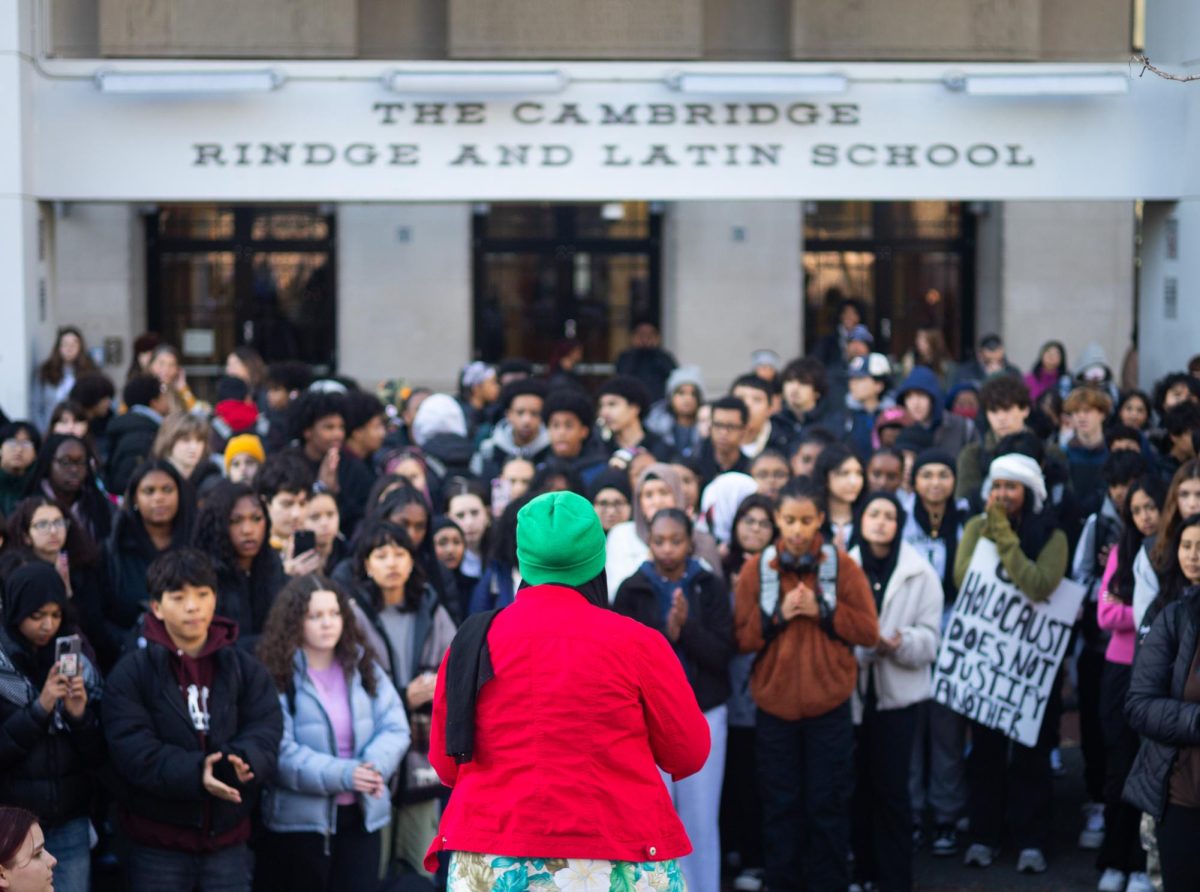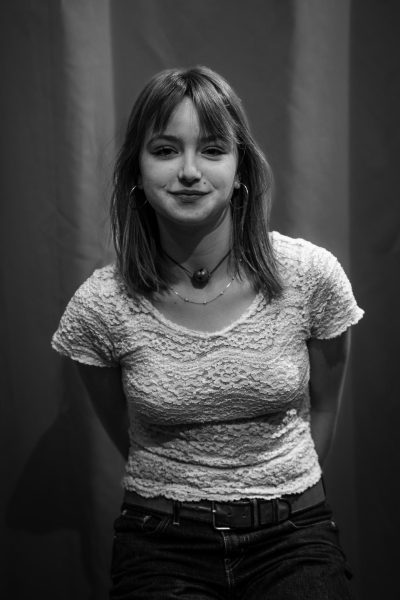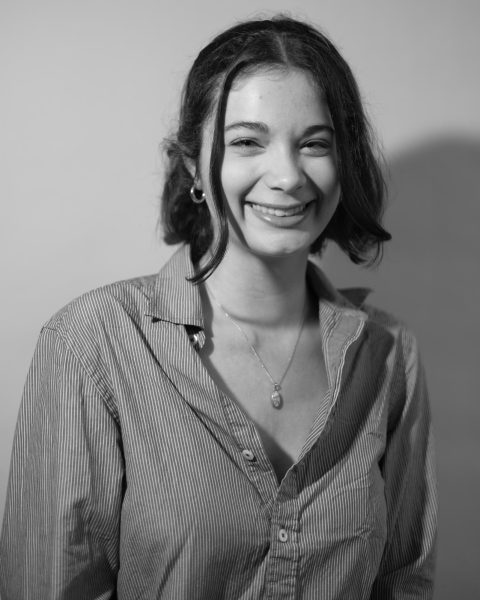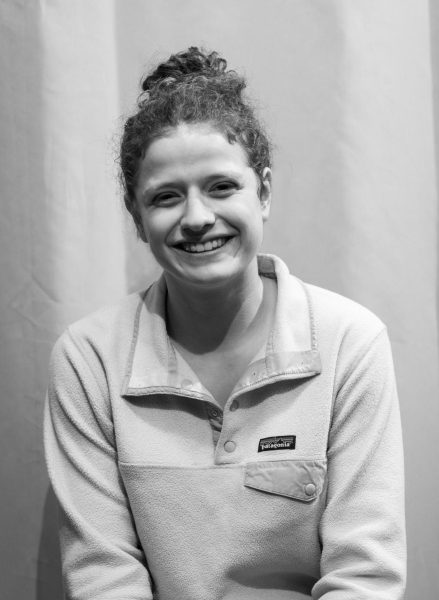“Every time the media lies, a neighborhood in Palestine dies,” rang the voices of hundreds of CRLS student demonstrators who attended the Free Palestine walkout on Thursday, November 30th. That day, student protesters across the school elected to skip their fourth-period classes to gather outside the CRLS main entrance. They were there to denounce Israel’s ongoing military campaign in Gaza, the city of Cambridge’s minimal response, and to demand more education about the conflict within CRLS classrooms.
“I decided we needed to have a walkout to bring attention to Palestinian voices within our school,” Yasmeen Abu-Rubieh ’25, a Palestinian student and walkout organizer, told the Register Forum. “We’re asking CRLS administrators and the CPS school district to create workshops, safe spaces, and more resources for bringing awareness to the conflict.”
In order to understand the walkout that occurred on November 30th, some historical context is necessary. European Jews who fled persecution during and after the Holocaust began the process of establishing a Jewish state in what is now Israel. This displaced hundreds of thousands of Palestinians, members of the already established population in the area. Palestinians originate from the land now under Israeli control. Many Palestinians refer to the land as Palestine, hoping to establish a state on that territory under the same name, says Vox.
On October 7th, 2023, the conflict escalated when the terrorist group Hamas led an attack on Israel. The attack left 1,200 Israelis, mostly civilians, dead, with another 240 taken hostage, according to the Associated Press.
The impacts of this conflict echo far beyond the Middle East. The Israel/Palestine conflict has been divisive in the US, and demonstrations in American cities throughout October and November have attracted tens of thousands of protesters. High school and college campuses in particular have been the site of marches, protests, and other actions pertaining to the conflict. As of November 30th, many CRLS students have joined a worldwide movement under the name Free Palestine.
For nearly 90 minutes, the gathered CRLS students listened in silence as student speakers highlighted the human rights abuses happening in Gaza and denounced the minimal response to the conflict from the school district and Cambridge as a whole.
“This is not about a conflict between religions.” Eman Almarzooqi ’24 told the crowd. “This is about a genocide. This is about ethnic cleansing. This is about an apartheid.” Urbana Barua ’25 and Kiara Henry ’25 emphasized how the conflict has destroyed hospitals and other key infrastructure within Gaza. “Hospitals are supposed to be a safe place where people receive care, but in Gaza that place is taken from them and has become a danger zone,” Henry said.
Fatoumata Barry ’25 read a poem for those in Palestine.
“You can not scrape away souls/from within the rubbled streets,/When they are still alive/even if it’s blind to the eye.” Mai Ibrahim ’25 shared a prayer for Palestine at the end of her speech.
Speakers, including Leya Hazboun ’24, also highlighted how the scant communication from CPS has rarely addressed more than one end of the conflict. “How do we pick and choose what atrocities we want to speak about? Are human right violations only considered violations when they are committed by our allies’ enemies?” she shouted into the mic.
Many more speakers demanded more action pertaining to the conflict within the community, in light of the Cambridge City Council’s decision to not endorse a ceasefire between Israel and Hamas (see more Register Forum coverage of this on our article “Cambridge Ceasefire Vote Fails”). Hazboun was one to emphasize the role that institutions–including CRLS, CPS, and the City Council–had to play in preventing conflict, saying “When people say no to a ceasefire it means only more children dead.” The repeated chant, “City councillors you can’t hide, we charge you with genocide,” echoed this sentiment.
Students who attended the walkout shared perspectives and reasoning for attending with the Register Forum. Many attendees emphasized bringing attention to the conflict and inspiring their classmates to pay more attention to its impact. “I truly hope that the walkout will educate people that are ignorant and unwilling to do their own research,” said Camila Robinson ’26. Evie Louis ’27 agreed. “By being here we are bringing more awareness to the conflict, getting people talking,”
Towards the end of the walkout, a group of counter-protesters arrived on the scene. The group of twelve adults, including some CPS parents, stood in front of the Cambridge Public Library. They held Israeli flags and signs with the faces of Israelis who had been taken hostage during the October 7th attack in Israel. Police and CRLS security formed a barrier between them and the student protesters, and students were forbidden from speaking with them during school hours.
“We are here to support those kids,” said one of the counter-protesters, referring to students who felt uncomfortable with the walkout. “It’s important to represent both sides of the story,” he said. One protester emphasized that the conflict has had an impact on civilian lives. “You don’t have to choose a side between Israel and Palestine for that matter in order to say that killing children and kidnapping kids is not okay,” she said.
Notably, the counter-protesters explained they were demonstrating for student safety. “The students will feel safer than if we weren’t here,” one explained to the Register Forum. She said their presence represented students who felt ostracized by the walkout. Though there were no students demonstrating alongside the counter-protesters, they told the Register Forum that students had thanked them for being there.
Some CRLS students at the walkout expressed frustration at the counter-protesters’ presence. “Yasmeen [Abu-Rubieh] took so long to organize this walkout,” said Samatha Ayala ’24. “For them to show up and try to ruin it is so frustrating.”
A theme running through the narratives told by both student protesters and counter-protesters was a demand for CRLS to offer more education about the history of Israel/Palestine. “It’s important for everyone to learn the facts,” stated one counter-protester. “Teach them how to learn,” said another. “Teach [students] how to find reliable information and how to use resources to become educated.”
Appearing at a School Committee meeting on December 5th, member Caroline Hunter addressed the walkout: “While we can’t solve international issues, we can provide a safe space for learning and for education and tolerance.”
Sisu de Sola ’24, a walkout attendee, criticized CRLS’s lack of education about the conflict. “It’s so harmful that the history isn’t being talked about in classes or in Falcon Blocks,” she told the Register Forum. Neelu Trivedi ’26 agreed, saying, “I haven’t discussed it in any of my classes in any way, shape, or form.”
Should the conflict be actively taught in classrooms? Students think so. “Just as schools educate us on the past, they should educate us on current issues,” Livy Ribbeck ’27 told the Register Forum. Charity Rounds ’25 agreed; “Knowledge is power, and as students we deserve that.”
This article also appears in our December 2023 print edition.
















